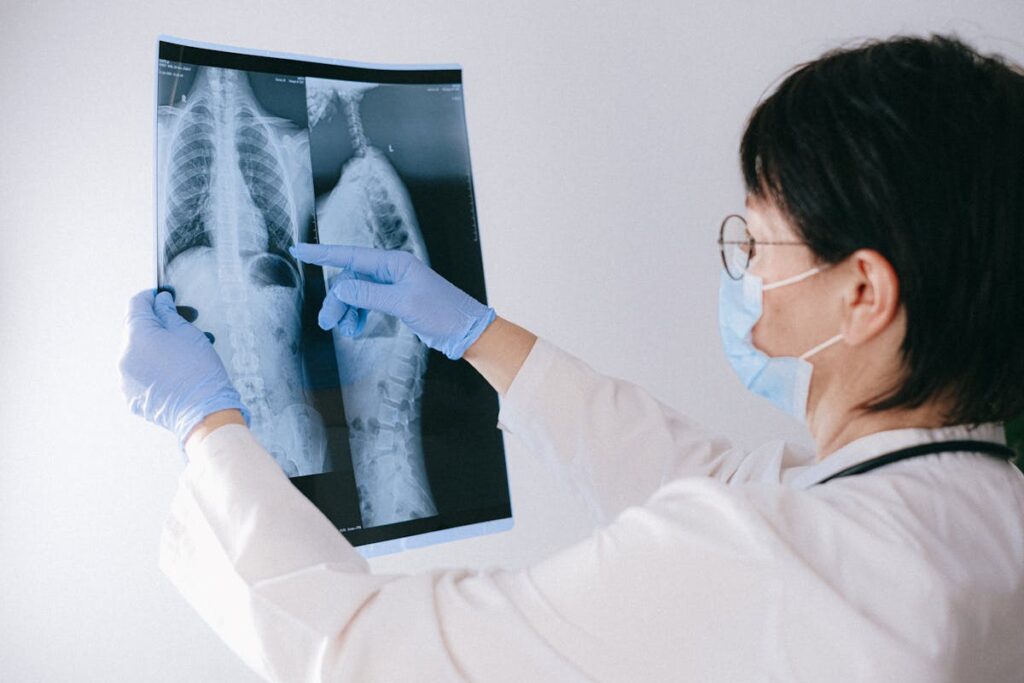Spinal fusion surgery is a critical procedure that often raises questions about the appropriate steps to take towards recovery. How might one manage post-operative pain effectively? What kind of physical activity is deemed safe and when should one initiate it? In what ways can diet contribute to healing and recovery? How should one adjust their lifestyle post-surgery and what role does mental health play in this recovery journey? How to navigate through these concerns while maintaining regular follow-ups with your healthcare provider forms an interesting discussion point. Let’s explore these aspects further.
Understanding Your Spinal Fusion
The journey towards recovery begins with an understanding of your spinal fusion surgery. This surgical procedure, aimed at correcting issues within the spinal anatomy, involves the joining or ‘fusion’ of two or more spinal vertebrae. The fusion is achieved by placing bone or bone-like material within the space between the vertebrae, which then grows during the healing process.
The ultimate goal of spinal fusion is to prevent movement between the fused vertebrae, reducing the pain caused by their movement. The procedure may also correct deformities or stabilize the spine after damage from a traumatic injury or disease. An understanding of your spinal anatomy and how it is altered during surgery is vital for a successful recovery.
The surgery’s success is heavily reliant on the healing process post-operation. The newly placed bone material will need to grow and fuse the vertebrae together. This growth is an essential part of recovery and is a process that can extend over several months. It requires patience, adherence to post-operative care instructions, and regular follow-up with your healthcare provider. Understanding the nature of the healing process can set realistic expectations and contribute to a smoother recovery journey.
Managing Post-Operative Pain
Maneuvering the landscape of post-operative pain is a significant aspect of recovery after spinal fusion surgery. It’s a necessary part of the healing process but can be effectively managed using a combination of pain management techniques and medication options.
As the body adjusts to the changes brought about by the procedure, discomfort and pain are expected. However, these should lessen gradually over time. Proper pain management is important to ensuring a smooth recovery process and improving your overall comfort.
Medication options often include both over-the-counter and prescription drugs. Analgesics, such as Tylenol or Aspirin, can provide temporary relief for mild pain, while nonsteroidal anti-inflammatory drugs (NSAIDs) like Ibuprofen or Naproxen can help reduce inflammation and pain. For severe pain, your doctor may prescribe opioids, but these should be used cautiously due to their potential for addiction.
In addition to medication, alternative pain management techniques such as heat or cold therapy, deep breathing exercises, and guided imagery can be beneficial in reducing discomfort. Remember, each patient’s experience with pain is unique, and what works for one may not work for another. It’s important to communicate openly with your healthcare provider to develop a pain management plan tailored to your specific needs.
Gradually Resuming Physical Activity
Steering the path towards physical activity after spinal fusion surgery is a delicate process requiring patience and attention to one’s body. It’s essential to understand that your body needs time to heal and adjust to the new physical condition. Consequently, any physical activity should be approached gradually and under the guidance of a healthcare professional.
Beginning with light exercises can markedly aid in your recovery. This can include gentle stretches, walking, and other low-impact activities that do not strain your back. These exercises are designed to boost your stamina, improve muscle strength, and enhance flexibility, all of which are fundamental for your overall recovery.
In addition to light exercises, mobility training is another critical aspect of regaining physical activity. Mobility training focuses on improving your body’s ability to move comfortably and efficiently. This includes activities that enhance joint movement, flexibility, and body coordination. It is important to note that each individual’s pace of recovery is different. Consequently, the intensity and frequency of exercises and mobility training should be personalized to fit your specific needs and progress.
Proper Nutrition for Healing
The role of proper nutrition in the healing process post-spinal fusion surgery cannot be overstated. A well-balanced diet and targeted supplements can markedly aid in promoting spine health during the recovery period. We will now explore the essential components of such a diet and the supplements that are beneficial for optimizing spine health.
Balanced Diet Post-Surgery
How essential is a balanced diet following a spinal fusion surgery, you may ask? The answer is: extremely. Proper nutrition aids in the healing process, ensuring that your body can repair itself effectively.
One crucial component of post-surgery nutrition is incorporating quality protein sources. Protein acts as the building blocks for new tissue growth and aids in the repair of damaged tissues. Include lean meats, dairy, eggs, and plant-based sources such as lentils and quinoa in your diet to meet your protein needs.
Equally important to protein is hydration. Water plays a critical role in numerous bodily functions, including nutrient transportation and waste elimination. Keeping well-hydrated can prevent constipation, a common side effect of many pain medications used post-surgery. Aim to drink at least eight glasses of water per day, unless advised otherwise by your healthcare team.
A balanced diet also includes plenty of fruits, vegetables, and whole grains. These foods supply essential vitamins, minerals, and fiber, which can aid in the healing process and overall health.
Supplements for Spine Health
Building upon the importance of a balanced diet for post-surgery recovery, it’s worth highlighting that certain supplements can play a significant role in spine health and the overall healing process.
Vitamin benefits are numerous and can be particularly impactful in this situation. For instance, Vitamin D is essential for calcium absorption and bone health, aiding in the stabilization and strengthening of the spine post-surgery. Vitamin C, a potent antioxidant, promotes tissue repair and mitigates inflammation, accelerating the healing process. B Vitamins, particularly B12, are essential for nerve health and can aid in reducing post-surgical neuropathic pain.
Mineral sources also hold significant value. Calcium, in conjunction with Vitamin D, is crucial for bone health and regeneration. Magnesium, often underappreciated, is important for muscle and nerve function, potentially easing post-surgical muscle spasms and discomfort.

Adjusting Your Lifestyle Post-Surgery
After undergoing spinal fusion surgery, significant alterations to your lifestyle are inevitable. The recovery period requires an extensive and methodical approach, focusing primarily on pain management and the use of mobility aids.
Pain management is a crucial part of the post-operative phase. It is essential to communicate with your healthcare provider about the severity and frequency of your pain. This shared decision-making will help to establish a tailored pain control plan, which may include medications, physical therapy, and alternative therapies such as acupuncture or massage.
Mobility aids are equally essential in the initial weeks after surgery. Assistive devices such as walkers or canes can help maintain balance and reduce the risk of falls while your body acclimatizes to the structural changes from the surgery. Gradually, as your strength and stability improve, the reliance on these aids will decrease.
Moreover, it is important to revise your daily activities and make necessary adjustments. This may include modifications in sitting, sleeping positions, and even in your work environment if necessary. It is important to remember that these changes are temporary and are integral for a successful recovery.
Mental Health After Spinal Fusion
Maneuvering the emotional landscape following spinal fusion surgery can be as challenging as dealing with the physical adjustments. Emotional resilience is essential during this recovery phase, and developing effective coping strategies is a key component to guarantee sound mental health.
Support networks play an important role in this journey. Friends, family, and support groups can provide comfort, reassurance, and practical help. Engaging with individuals who understand your situation can greatly enhance your emotional resilience and provide motivation techniques to keep you moving forward.
Mindfulness practices, such as meditation and yoga, can also contribute to mental well-being post-surgery. These techniques promote relaxation, stress management, and present moment awareness, fostering a positive mindset and aiding in pain management.
Therapy options, including cognitive behavioral therapy (CBT), can be beneficial. CBT aids in changing negative thought patterns and implementing positive affirmations, thereby promoting a healthier mental state.
Lastly, stress management is essential. Chronic stress can impede recovery and worsen pain perception. Techniques such as deep breathing, progressive muscle relaxation, or guided imagery can be effective.
Regular Follow-Ups With Your Doctor
While managing mental health is an integral part of recovery, maintaining consistent communication with your healthcare provider is equally important. Regular follow-ups with your doctor are essential in the post-operative phase of a spinal fusion. These appointments allow for proactive pain management, guaranteeing that discomfort is addressed promptly and efficiently.
Follow up appointments also enable your healthcare provider to monitor your progress, assess healing, and make any necessary modifications to your treatment plan. If there are any concerns about the recovery process or complications from the surgery, these appointments provide the opportunity to discuss them. Your doctor can also provide guidance on resuming activities and answer any questions you may have.
Pain management is a key aspect of these appointments, helping you navigate the potentially challenging post-operative period. Your doctor may prescribe medication, recommend physical therapy, or suggest other non-pharmacological strategies to manage pain effectively. Regular communication with your healthcare provider can help guarantee a smooth, successful recovery process.
Frequently Asked Questions
Will Spinal Fusion Affect My Sexual Function or Intimacy?
Spinal fusion may temporarily impact sexual health due to post-surgical discomfort. However, most patients regain normal function over time. Intimacy concerns can be mitigated through communication with your partner and consultation with your physician.
Can I Travel Long Distances After Undergoing Spinal Fusion Surgery?
Post spinal fusion surgery, long-distance travel should be discussed with your healthcare provider. Adhering to individualized recovery strategies and implementing appropriate travel tips can potentially facilitate a safe and comfortable journey.
How Can Spinal Fusion Impact My Ability to Get Pregnant or Carry a Child?
Spinal fusion can potentially affect fertility and pregnancy. Fertility concerns may arise from medication side effects. Pregnancy complications could include increased back pain or challenges during delivery. Always consult your doctor for personalized advice.
Is It Safe to Undergo Chiropractic Treatments After Spinal Fusion Surgery?
Post-operative chiropractic safety is essential following spinal fusion surgery. Consultation with your surgeon is advised before any chiropractic treatment to guarantee procedures align with your specific recovery needs and do not compromise surgical outcomes.
Can I Participate in High-Impact Sports or Activities Post Spinal Fusion?
Participation in high-impact sports post spinal fusion may be possible, but it requires careful consideration. Rehabilitation exercises and activity modifications are essential to guarantee safety and gradual progression towards more strenuous activities. Always consult your physician first.
